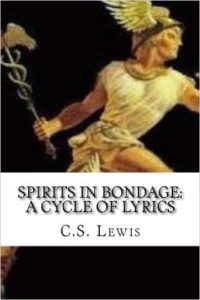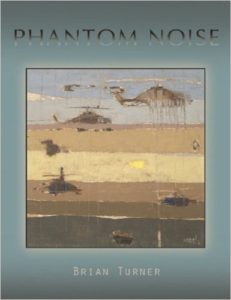Spirits in Bondage, A Cycle in Lyrics and Phantom Noise
 by C.S. Lewis (as Clive Hamilton),
by C.S. Lewis (as Clive Hamilton),
released online by Project Gutenberg in 1999,
Ebook No. 2003, http://www.gutenberg.org/ebooks/2003.
Reissued in print by Cosimo Classics, 2005,
88 pages, paper,
ISBN-10: 1596053720
Buy the Book
 Phantom Noise,
Phantom Noise,
by Brian Turner,
Alice James Books, 2010,
93 pages, paper, $16.95,
ISBN: 978-1-882295-80-7
Buy the Book
If we ever have a true history of the Iraq Wars, it will have come from the slant of poets in the trenches, not from embedded journalists or other official spokespersons.
I was reminded of this when, looking for information on C.S. Lewis’ later fantasy writing, I came upon his 1919 first book of poems, Spirits In Bondage, in the public domain on Project Gutenberg. As a 19 year-old, Lewis was thrown into one of the most horrific battles of WWI, experienced trench warfare in one of the worst tank battles of the Somme, was wounded, saw his best friend killed, and finally returned home to care for his friend’s family. Fortunately, Lewis had one resource that most of his fellow soldiers in 1916 did not have: He could write about the horrors of battle.
In the first poem, Lewis personifies the atrocities of war he has experienced through the personage of Milton’s ruined archangel Satan:
I am Nature, the Mighty Mother,
I am the law: ye have none other.
I am the flower and the dewdrop fresh,
I am the lust in your itching flesh.
I am the battle’s filth and strain,
I am the widow’s empty pain.
I am the sea to smother your breath,
I am the bomb, the falling death. . . .
The poems that follow record young Lewis wrestling with the fallen archangel for nothing less than his soul, and those of his fellow soldiers. I very much recommend this text, a free download from www.projectgutenberg.com. Those interested in following Lewis’ mythological trail might read these poems as a roman à clef of his early career.
The casualties in the Somme were horrific. According to John Keegan’s A History of Warfare, the British Army lost 20,000 men on first day of the Somme, July 1, 1916. Lewis was a part of a battle in which machine guns fired six hundred times per minute and killed a thousand-man British regiment in an few minutes. Lewis’ poems directly absorbed the shock of his experiences of trench warfare, atrocities, post-traumatic shock, and reentry into society.
In the most recent wars, I find the American poet Brian Turner confronting war no less earnestly than Lewis did. Over half of Turner’s poems were written in Iraq, at a time when American casualties were flown home under covert conditions. Turner could not keep the battle events at as much of a literary distance as Lewis could; he works in a very different way than Lewis, the mythologist who clothed his experiences in fantasy and myth. In contrast, Turner is a realist, in the sense of Stephen Crane, constantly peeling away layers of experience until he gets to what is real.
His first book, Here, Bullet (Alice James, 2005) was a shot heard round the world. There is nothing between this poet and the bullet, directly addressed to him. Some considered it the first shot in the peace poetry movement. I did not. Poetry cannot stop wars; it can only get us closer to the truth of them. For a long time after encountering these poems, I read no newspaper and listened to no nightly news. This news from Brian Turner in the trenches was not only the truest news I had of the Iraq War; it was the only news. And it holds up well after three years, preserving the landscape of this unfortunate war with bone – chilling accuracy through the voice of a soldier’s deepest reflections.
Brian Turner’s second book, Phantom Noise (Alice James, 2010), is an even more confident collection. Here, the personal wrestling with war and belief is much more in the foreground than Lewis’ struggle was. The book begins with a series of traumatic flashbacks in the longest poem of the collection, called “At Lowe’s Home Improvement Center.” These flashbacks were well known in my own family because my father suffered shell shocks, as they were then called, after World War II. I recalled witnessing them when I encountered Turner’s description of a flashback in progress:
Standing in aisle 16, the hammer and nail aisle,
I bust a 50 pound box of double -headed nails. . . .
In a steady stream
they pour onto the tile floor, constant as shells. . . .
Turner’s poems shine light on key issues that will not go away. “Insignia,” a poem for women sexually molested by their own superior officers, is both sad and horrifying. The epigraph takes dead aim at the reader and refuses to let us wander from the statistic that “[o]ne in three female officers will experience / sexual assault while serving in the military.” Without letting the reader turn away, the story begins its own unfolding:
She hides under a deuce n’half this time — sleeping
on a roll of foam, draped in mosquito netting.
It goes on to address her terrorizer:
It’s you she’s dreaming of, Sergeant — she’ll dream of you
for years to come. If she makes it out of this country alive,
which she probably will. You will be the fire and the
hovering
breath. Not the sniper. Not the bomber in the streets.
As often happens in Turner’s poems, the one about to assault and the one about to be assaulted respond within the hair-trigger constraints of combat. Lewis, too, has poems that suggest the molestation of civilians by his fellow soldiers. Like Lewis, Turner takes the side of individual human spirits held in bondage by war.
Both poets return to society and more hopeful settings “barred against despair.” For Lewis, the poem “Oxford” describes the psychological space of their homecoming:
We are not wholly brute. To us remains
A clean, sweet city lulled by ancient streams,
A place of visions and of loosening chains,
A refuge of the elect, a tower of dreams.
She was not builded out of common stone
But out of all men’s yearning and all prayer
That she might live, eternally our own,
The Spirit’s stronghold-barred against despair.
Turner ends up finding that psychological space in Olympic National Park:
. . . I put nothing in The Jar of Quiet Thoughts nearby.
Because there is not one thing I might say to the world
which the world does not already know.
Yet both these poets, who have been in harm’s way, have much to say to us.
— Mark Schorr

